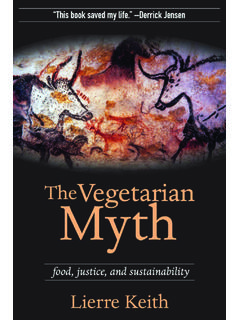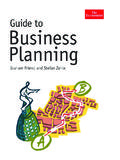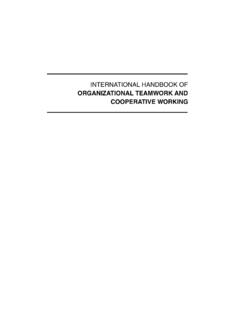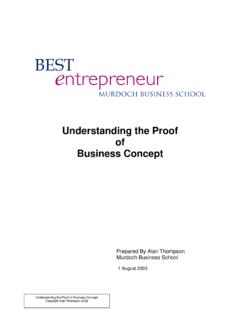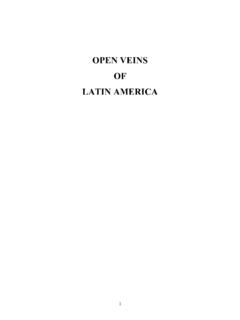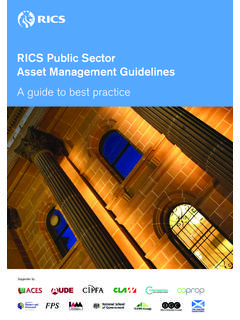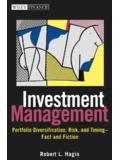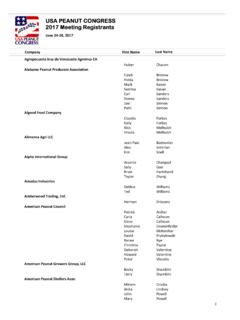Transcription of This page intentionally left blank - United Diversity
1 this page intentionally left blank Stakeholder Theory In 1984, R. Edward Freeman published his landmark book, Strategic Management: A Stakeholder Approach, a work that set the agenda for what we now call stakeholder theory. In the intervening years, the literature on stakeholder theory has become vast and diverse. this book examines this body of research and assesses its relevance for our understanding of modern business. Beginning with a discussion of the origins and development of stakeholder theory, it shows how this corpus of theory has in uenced a variety of different elds, including strategic management, nance, accounting, management, marketing, law, health care, public policy, and environ- ment.
2 It also features in-depth discussions of two important areas that stakeholder theory has helped to shape and de ne: business ethics and corporate social respon- sibility. The book concludes by arguing that we should re-frame capitalism in the terms of stakeholder theory so that we come to see business as creating value for stakeholders. R. Edward Freeman is Olsson Professor of Business Administration and Co-Director of the Olsson Center for Applied Ethics at the Darden School of Business, University of Virginia. Jeffrey S. Harrison is the W. David Robbins Chair of Strategic Management and Director of the Innovation and Entrepreneurship Program at the Robins School of Business, University of Richmond.
3 Andrew C. Wicks is Associate Professor of Business Administration, Co-Director of the Olsson Center for Ethics, and Academic Advisor for the Business Roundtable Institute for Corporate Ethics at the Darden School of Business, University of Virginia. Bidhan Parmar is Lecturer in Business Administration at the Darden School of Business, University of Virginia. Simone de Colle is a PhD candidate in management and business ethics at the Darden School of Business, University of Virginia. Stakeholder Theory The State of the Art R. Edward Freeman Jeffrey S. Harrison Andrew C. Wicks Bidhan Parmar Simone de Colle CAMBRIDGE UNIVERSITY PRESS. Cambridge, New York, Melbourne, Madrid, Cape Town, Singapore, S o Paulo, Delhi, Dubai, Tokyo Cambridge University Press The Edinburgh Building, Cambridge CB2 8RU, UK.
4 Published in the United States of America by Cambridge University Press, New York Information on this title: R. Edward Freeman, Jeffrey Harrison, Andrew Hicks, Bidhan Parmar and Simone de Colle 2010. this publication is in copyright. Subject to statutory exception and to the provision of relevant collective licensing agreements, no reproduction of any part may take place without the written permission of Cambridge University Press. First published in print format 2010. ISBN-13 978-0-511-67692-5 eBook (NetLibrary). ISBN-13 978-0-521-19081-7 Hardback ISBN-13 978-0-521-13793-5 Paperback Cambridge University Press has no responsibility for the persistence or accuracy of urls for external or third-party internet websites referred to in this publication, and does not guarantee that any content on such websites is, or will remain, accurate or appropriate.
5 To stakeholder researchers, theorists, and critics all over the world. Thank you. Contents List of gures page ix List of tables x Acknowledgements xi Preface xv Part I The genesis of stakeholder theory 1 The problems that stakeholder theory tries to solve 3. 2 The development of stakeholder theory: a brief history 30. 3 Stakeholder theory, pragmatism, and method 63. Part II Stakeholder theory and the traditional disciplines of business 4 Stakeholder theory and strategic management 83. 5 Stakeholder theory in nance, accounting, management, and marketing 121. 6 Stakeholder theory in related disciplines 163. Part III Stakeholder theory, ethics, and corporate social responsibility 7 Stakeholder theory and business ethics 195.
6 8 Stakeholder theory and corporate social responsibility 235. viii Contents Part IV Stakeholder theory: some future possibilities 9 Stakeholder theory and capitalism 267. 10 Questions on the horizon 286. Bibliography 292. Index 338. Figures Transactions cost theory page 18. Creating value for stakeholders 24. Generalized contributor group interaction between the rm and its environment 90. The organization and its primary stakeholders 105. Competing stakeholder networks 118. UN Global Compact Ten Principles 256. Table Residual and integrated approaches on corporate social responsibility page 258. Acknowledgements The arguments in this book have been developed in a number of places over the years.
7 We have drawn liberally from these sources, and we thank a variety of co-authors, editors, and publishers for their kind permission to allow us to keep the copyrights involved, or to use and recast some of the material here. Chapter 1 is based on Freeman, Wicks, and Parmar, Stakeholder theory as a basis for capitalism, (in press) in a volume from Palgrave, edited by Lorenzo Saccone, Margaret Blair, and Freeman, that results from the International Economics Association meeting in Trento, Italy, in 2006. It also owes a debt to Freeman, Harrison, and Wicks, Managing for Stakeholders, Yale University Press (2007); Freeman, Managing for stakeholders, in N. Bowie, T. Beauchamp, and D.
8 Arnold (eds.), Ethical Theory and Business, 8th edn., Prentice-Hall (2008); and B. Agle, T. Donaldson, Freeman, M. Jensen, R. Mitchell, and D. Wood, Dialogue: Toward superior stakeholder theory, . Business Ethics Quarterly, 18 (2) (2008), 153 190. Chapter 2 is based on Freeman (1984, 2004, 2005). Chapter 3 draws on Freeman and D. Newkirk, Business as a human enterprise: Implications for education, in S. Gregg and J. Stoner (eds.), Rethinking Business Management, Princeton: Witherspoon Institute (2008);. and Freeman and Newkirk's Business school research: Some preliminary suggestions working paper (2008), available from the Social Science Research Network. It also draws on Freeman, The relevance of Richard Rorty to management research, Academy of Management Review, 29 (1) (2004), 127 130; and Wicks and Freeman (1998).
9 Chapter 9 draws on Freeman (2000); Freeman and Phillips (2002);. Freeman, K. Martin, and Parmar (2006); and Freeman, K. Martin, and Parmar, Stakeholder capitalism, Journal of Business Ethics, 74 (4) (2007), 303 314. Many people have been involved with this project over the years, and have contributed in a variety of ways, especially in helping us to get clearer about what stakeholder theory really is and how it can be developed. The early xii Acknowledgements pioneers at Wharton are detailed in Chapter 2, but personal thanks to Russell Ackoff, James Emshoff, Howard Perlmutter, Ian Mitroff, Alan Shapiro, and the late Eric Trist are still in order. More recently Robert Phillips, of the University of Richmond, has been our partner in much of this work, as he has pursued his own interpretation of stakeholder theory, found in Phillips (2003a and b).
10 His colleague Doug Bosse at Richmond has been helpful as well. Our co-authors of other related works deserve special mention, especially Professor Kirsten Martin at Catholic University, Jared Harris at Darden, and Rama Velamuri at IESE. Gordon Sollars of Fairleigh Dickenson University has been our most persistent friendly critic since 1977. Patricia Werhane has been an intellectual force for those of us at Darden for many years; she has made this book better. We would like to acknowledge the contributions and support of former Darden School deans John Rosenblum, Leo Higdon, and Robert Harris, and the current dean, Bob Bruner. Darden, and the Robins School at Richmond, have been terri c places to work on stakeholder theory.


